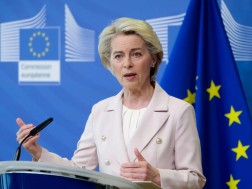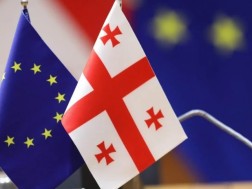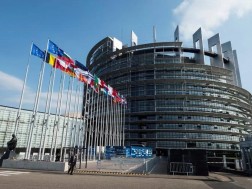The EU will freeze Georgia’s membership bid if Tbilisi enacts a controversial “foreign agents” law critics say is inspired by Vladimir Putin’s Russia.
The ruling Georgian Dream party on Tuesday adopted the bill, which obliges media and civil groups that receive foreign funding to register with the government, despite months of demonstrations and repeated warnings from Brussels.
A decision by the bloc to start accession talks was likely to be indefinitely postponed if the law came into force, three EU officials told the Financial Times.
“We have been very clear . . . this is a showstopper,” said a person briefed on the discussions between Georgian and EU officials in recent days. “[The Georgian government] knows what the score is.”
A final vote by the ruling majority is expected in the coming weeks once the country’s president, Salome Zourabichvili, refuses to sign off on it as promised and sends it back to parliament.
Georgia applied for EU membership in March 2022, weeks after Russia launched its full-scale invasion of Ukraine, and was granted candidate status in December. The next step is for the European Commission to make a formal recommendation for EU governments to greenlight the start of membership talks, a step that is conditional on a set of reforms.
Brussels has made clear that if the law is enacted, the commission will not make that recommendation, the officials said.
“The adoption of this law negatively impacts Georgia’s progress on the EU path,” the commission said on Wednesday. It added that the bloc had “clearly and repeatedly stated that the spirit and content of the law are not in line with EU core norms and values”.
The commission said that the law would “undermine the work of civil society and independent media”, putting Georgia on a collision course with the bloc’s treaties that guarantee freedom of association and freedom of expression.
Civil society groups have warned that authorities could use their new powers to stigmatise and harass civil society organisations to suppress their work.
The foreign ministers of Latvia, Lithuania, Estonia and Iceland met Zourabichvili on Wednesday and stressed that the law closed the EU path for Georgia.
Estonia’s foreign minister Margus Tsahkna said Georgia stood at a crossroads: “This law is a symbol of the choice between Russia and the EU. This law separates Georgia from the European Union.”
He warned that if the bill was enacted, Georgia could lose not only its membership perspective, but also current benefits such as visa-free travel to the EU.
On Tuesday evening, other European officials joined crowds outside the Georgian parliament, where demonstrators were waving EU flags.
“You are not radicals, you are European mainstream, because you fight for democracy!” said Michael Roth, chair of the foreign affairs committee of the German parliament. “We can’t be in the parliament, but we can be here with you. We hear you! Tbilisi is a European capital!”
Source: The Financial Times























